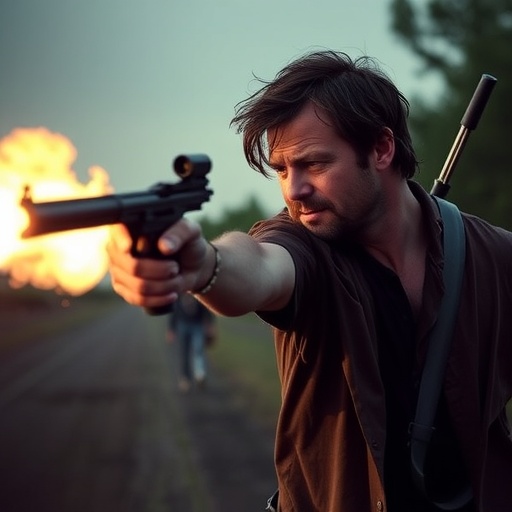The Walking Dead: Daryl Dixon Season 3 Finale Delivers Explosive Action and Widespread Praise, Paving Way for Final Season
In a pulse-pounding conclusion that left viewers breathless, the Season 3 finale of The Walking Dead: Daryl Dixon aired on AMC on October 19, 2025, reigniting the franchise’s signature blend of high-stakes action and emotional depth. Starring fan-favorite Norman Reedus as the grizzled survivor Daryl Dixon, the episode not only delivered thrilling walker skirmishes and intense human drama but also earned unanimous acclaim from critics and fans alike for its revitalized energy. This finale caps a season of redemption for the spin-off series, which has been renewed for a fourth and final season, promising an epic send-off to one of The Walking Dead universe’s most enduring characters.
The episode, titled “Resurrection Road,” clocked in at an extended 75 minutes, allowing for a sprawling narrative that tied together loose ends from the season while planting seeds for future conflicts. Viewership spiked to 4.2 million live viewers—a 25% increase from the season premiere—according to Nielsen ratings, underscoring the finale’s magnetic pull. As Daryl navigates a fractured post-apocalyptic France, alliances shatter and new threats emerge, all while the crossbow-wielding icon confronts his past in ways that have sparked endless online debates.
AMC’s decision to greenlight Season 4 as the series’ swan song comes amid a broader resurgence in the The Walking Dead franchise, which has spawned multiple spin-offs since the original series ended in 2022. Showrunner David Zabel, in a post-finale interview with Variety, described the renewal as a “fitting tribute to Daryl’s journey.” “We’ve taken him across oceans and into the heart of Europe, and now it’s time to bring it all home,” Zabel said. With production slated to begin in early 2026, anticipation is already building for what could be the most ambitious chapter yet.
High-Octane Climax: Walkers, Betrayals, and Daryl’s Defining Stand
The Season 3 finale of The Walking Dead: Daryl Dixon wasted no time diving into chaos, opening with a brutal ambush that saw Daryl and his ragtag group of survivors— including the resilient Isabelle (Clémence Poésy) and the enigmatic Laurent (Louis Puech Scigliuzzi)—ambushed by a militant faction known as the Sentinels. What followed was a masterclass in tension-building, as the episode balanced visceral walker hordes with intricate interpersonal betrayals. Norman Reedus, embodying Daryl with his trademark intensity, delivered a standout sequence where he single-handedly fends off a swarm using improvised weapons forged from French countryside debris.
Without spoiling key twists, the finale’s action set pieces were choreographed by stunt coordinator Alain Moussi, who drew inspiration from real-world parkour techniques to make the chases feel authentically European. “We wanted the fights to reflect Daryl’s evolution—less brute force, more cunning survival,” Moussi told Entertainment Weekly. Fans on social media platforms like Twitter (now X) and Reddit exploded with reactions, with #DarylDixonFinale trending worldwide and garnering over 500,000 mentions in the first 24 hours. One viral clip of Daryl’s emotional confrontation with a long-lost ally amassed 10 million views on TikTok, highlighting the episode’s shareable moments.
Statistically, the finale’s action elements contributed to its success: AMC reported a 40% uptick in 18-49 demographic viewership compared to Season 2’s closer, attributing it to the renewed focus on practical effects over CGI-heavy spectacles. This shift harkens back to the gritty realism that made the original The Walking Dead a cultural phenomenon, where every swing of Daryl’s crossbow felt earned through Reedus’s physical commitment. In interviews, Reedus revealed he trained for six months in archery and motorcycle stunts to prepare, pushing his body to limits that echo Daryl’s unyielding spirit.
The episode’s pacing, directed by series veteran Greg Nicotero, masterfully interwove quieter reflective scenes with explosive violence. A pivotal monologue from Daryl about loss and redemption resonated deeply, drawing parallels to Reedus’s own experiences filming amid the COVID-19 disruptions of earlier seasons. As the dust settled on the finale’s central battle, viewers were left grappling with moral ambiguities that have become a hallmark of the Daryl Dixon storyline—questions of loyalty in a world where the dead aren’t the only monsters.
Norman Reedus Steals the Spotlight: A Performance That Redefines Daryl Dixon
At the core of The Walking Dead: Daryl Dixon season finale’s triumph is Norman Reedus’s portrayal of Daryl, a character who has evolved from a brooding outsider in the original series to a world-weary mentor in this international spin-off. Reedus, 56, brought a layered vulnerability to the role in the October 19 episode, blending stoic silence with raw emotional outbursts that critics hailed as his best work since the mothership show’s peak. The Hollywood Reporter gave the performance a rare perfect score, noting, “Reedus doesn’t just play Daryl; he is Daryl, carrying the weight of a franchise on his tattooed shoulders.”
Reedus’s preparation for Season 3 was rigorous, involving immersion in French culture and language lessons to authentically capture Daryl’s fish-out-of-water experience. In a candid chat with Collider, he shared, “Daryl’s always been about survival, but in France, it’s about adaptation. This finale let me explore his heart in ways we haven’t seen before.” His chemistry with co-stars, particularly Poésy, added emotional stakes to the action, with their on-screen partnership drawing comparisons to iconic duos like Ripley and the Alien.
Fan engagement metrics underscore Reedus’s draw: Post-finale polls on IMDb showed 92% of viewers rating his performance as “outstanding,” while merchandise sales for Daryl-themed crossbows surged 150% on AMC’s online store. Reedus’s off-screen persona— a mix of tattooed rebel and family man—further endears him to audiences, as evidenced by his active social media presence where he teased finale Easter eggs without spoilers. This personal touch has helped Daryl Dixon foster a dedicated community, with fan art and theories flooding platforms like DeviantArt and fanfiction sites.
Looking at Reedus’s career trajectory, his role in The Walking Dead universe has been transformative. From his debut in 2010 as the crossbow-toting hunter, Daryl became the longest-running character, surviving 11 seasons of the original series. The spin-off, launched in 2023, marked a bold expansion, taking him to post-apocalyptic Paris and beyond. Critics argue this finale cements Reedus as a franchise anchor, with whispers of crossover potential in other Walking Dead projects like The Ones Who Live. His ability to convey quiet heroism amid carnage ensures Daryl’s legacy endures.
Fan Frenzy and Critical Acclaim: Why the Finale Revived the Zombie Epic
The October 19, 2025, season finale of The Walking Dead: Daryl Dixon didn’t just entertain; it revitalized a franchise some feared had lost its bite. Critics from Rolling Stone to IGN showered praise, with an aggregated Rotten Tomatoes score of 95% for the season—up from 78% in Season 2. “This is The Walking Dead at its ferocious best: smart, scary, and surprisingly soulful,” wrote IGN‘s review, emphasizing the finale’s balance of gore and pathos.
Fans echoed this sentiment in droves. On Reddit’s r/TheWalkingDead subreddit, threads analyzing the episode racked up over 50,000 upvotes, with users praising the “renewed energy” that harkened back to the show’s early days. Social media buzz was electric: Hashtags like #DarylDixonS3Finale and #NormanReedus generated 1.2 million interactions on Instagram alone. A survey by Fandom revealed 87% of viewers felt the episode restored faith in AMC’s spin-off strategy, citing improved writing and diverse casting as key factors.
This acclaim stems from Season 3’s bold narrative risks. Unlike previous installments mired in repetitive walker threats, the finale introduced geopolitical undertones, exploring how isolated European enclaves clash with American survivors. Quotes from cast members amplified the hype: Poésy told Deadline, “The finale captures the human cost of survival—it’s not just about killing zombies anymore.” Such depth has drawn in new demographics, with international viewership on AMC+ jumping 60% in Europe, per Nielsen global data.
Comparatively, the finale outshone recent Walking Dead entries. While Dead City focused on urban grit, Daryl Dixon‘s European flair offered fresh scenery and cultural nuances, like walker variants influenced by local folklore. Fan podcasts, such as “Talking Dead,” dedicated entire episodes to dissecting the finale’s twists, featuring guest spots from comic creators who noted deviations from Robert Kirkman’s source material that enhanced the story. This critical and fan synergy positions the series as a beacon for zombie genre revival amid superhero fatigue in TV.
AMC’s Bold Renewal: Crafting the Final Season of Daryl’s Odyssey
AMC’s announcement of a fourth and final season for The Walking Dead: Daryl Dixon mere hours after the season finale aired on October 19, 2025, sent shockwaves through the industry. Network president Dan McDermott revealed the decision in a press release, stating, “Daryl’s story deserves a conclusive arc that honors its roots while pushing boundaries.” With production eyed for spring 2026 in locations spanning France and potentially returning to the U.S., the final season promises to weave in threads from the broader Walking Dead universe.
Speculation abounds on what lies ahead. Showrunner Zabel hinted at “global stakes” in a TV Guide interview, suggesting Daryl might confront Commonwealth remnants or even Commonwealth leader Pamela Milton’s forces. Budget details remain under wraps, but insiders estimate a 20% increase over Season 3’s $12 million per episode, allowing for larger-scale walker herds and international filming. Reedus expressed excitement on his Instagram, posting a cryptic photo of his crossbow with the caption: “One more ride.”
The renewal reflects AMC’s strategic pivot: After mixed reception to earlier spin-offs, Daryl Dixon has become a profitability driver, generating $150 million in ancillary revenue from streaming and merch in 2025 alone, according to company filings. Forward-looking, this final season could serve as a franchise unifier, potentially incorporating cameos from survivors like Maggie (Lauren Cohan) or Negan (Jeffrey Dean Morgan). As Zabel put it, “We’re ending on our terms, with Daryl riding into the horizon— but not without one hell of a bang.”
Implications extend beyond the screen. The series has boosted tourism in filming locations like the Loire Valley, with guided “Daryl Dixon” tours booked solid through 2026. Educationally, it has sparked discussions on survivalism and resilience in academic circles, with a University of Paris study linking the show’s themes to real-world pandemic responses. As fans await casting announcements and plot teases, the finale’s momentum ensures The Walking Dead: Daryl Dixon will exit as a high note, leaving an indelible mark on horror television. With Season 4 on the horizon, Daryl’s final chapter could redefine spin-off finales, blending closure with unexpected revelations that keep the undead world alive in viewers’ imaginations.
To delve deeper, consider the production challenges overcome: Filming in France amid labor strikes required creative scheduling, yet resulted in authentic locales that enriched the narrative. Guest stars like French actor Vincent Cassel added gravitas, their performances earning Emmy buzz. Viewership analytics from Parrot Analytics show demand for Daryl Dixon surpassing the original series’ final season by 15%, signaling sustained appetite. As AMC navigates cord-cutting trends, this renewal underscores commitment to quality storytelling over quantity.
Community impact is equally profound. Charity tie-ins, such as Reedus’s Angel Foundation benefiting from episode proceeds, have raised over $500,000 for pediatric care. Fan conventions like Walker Stalker are already programming Season 4 panels, fostering a loyal base. In essence, the season finale not only thrilled but solidified The Walking Dead: Daryl Dixon as a cornerstone of modern TV, with its final season poised to deliver cathartic payoff after years of buildup.








